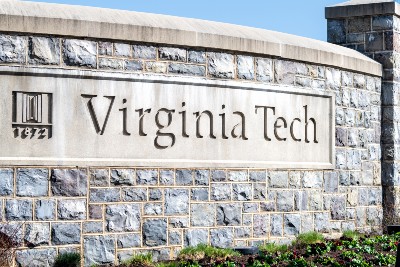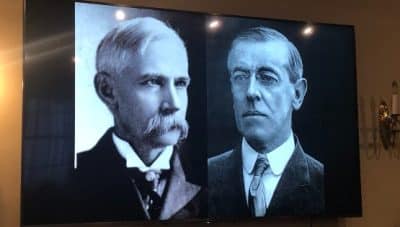
What are resourceful, masked, and green all over? Virginia Tech sustainability interns on a mission to save the Earth.
Students in the Virginia Tech Office of Sustainability’s internship program donned personal protection equipment and channelled powers of Zoom teleportation to influence environmental change on the Blacksburg campus in the face of COVID-19.
During the 2020-21 academic year program, students were provided with a team and mentor to address a sustainability challenge on campus.
“Our office identifies and works with faculty and staff mentors who have environmental stewardship-related project ideas that they may need help implementing. We partner with units like Dining Services, Stormwater Management, Office of University Planning, Alternative Transportation, Housing and Residence Life, Campus Kitchen, and many others,” said Nathan King, sustainability program manager.
The four intern teams — Energy, Food, Waste, and Water — developed eco-friendly educational and lifestyle programs, procurement practices, and waste reduction initiatives.
- Energy Team: The team, in collaboration with Dining Services, Housing, and Residence Life Sustainability Manager Blake Bensman, drafted a proposal for a Green Room Certification for Housing and Residence Life. The program would serve as a pathway for students to learn more about sustainable living, including reducing energy usage, returning green reusable containers to the dining centers, utilizing alternative transportation, and recycling.
- Food Team: Using the FoodPro database, students worked with Dining Services and Bensman to catalog items as locally sourced, recyclable, and/or compostable within Dining Services’ inventory database.
- Waste Team: In partnership with Dining Services and Bensman, students performed research and analysis in support of waste reduction efforts The student interns focused on data analysis of each dining center’s end-of-day pre-consumer food waste log recording.
- Water Team: The team worked with Stormwater Management Water Resources Specialist Katelyn Muldoon to create a training video of macroinvertebrate stream sampling and supplementary educational materials to be shared with students ranging from kindergarten to 12th grade.
The interns also helped host 2021 Earth Week events including a food drive, educational trail walk, tabling at dining halls, and social media activities.
“I loved being able to work with a group of students to make campus living better. This year felt less connected because of virtual classes and meetings, so working closely with my team made me feel more connected to other Virginia Tech students,” said recent applied economic management graduate and lead member of the Energy Team Natalie Koppier. “Working toward a common goal to make campus living more environmentally-friendly also helped me feel more engaged in the university community.”
The Office of Sustainability also partnered with Virginia Tech Career Services to provide interns with opportunities to participate in the Cooperative Education and Internship Program. Through the partnership, students took advantage of career and resume advising, as well as networking opportunities.
“Sustainability interns have many top-notch opportunities to develop leadership, teamwork, project management, and communication skills in the program,” said King.
Along with campus leaders, the students even engaged with their counterparts in Radford University’s Office of Sustainability internship program.
“We have been meeting with Radford’s Office of Sustainability two-to-three times a year. It is a great way for our intern teams to network and find out what other universities are doing in sustainability. The students usually come away with many new ideas for projects and can learn from each other’s successes. We hope to further foster these types of partnerships and give our interns opportunities to network with other sustainability offices throughout the commonwealth,” added King.
Several interns also participated in the development of the 2020 Climate Action Commitment. The commitment, approved initially in 2009 by the Virginia Tech Board of Visitors, is the university’s guiding framework around sustainability and energy efficiency in campus operations, facilities, curriculum, and research. It was recently renewed to reflect university growth and environmental stewardship leadership goals. One of its tenets includes leveraging campus as a living laboratory.
“We want all of our interns to take advantage of all the education, expertise, technology, and opportunities that the campus can provide. This will help them develop the knowledge and skills needed to compete in a world that is rapidly shifting towards more sustainable development,” said King.
Koppier agrees. Establishing environmentally friendly habits can be implemented across numerous disciplines.
“Sustainability is involved in everything! Every major or study can be linked to environmentalism and sustainability, whether it’s engineering, product design, city planning, economics, or anything else. Climate change will have impacts that reach across every sector, and everyone has a part to play in creating a sustainable society for the future. You don’t need to have a strong passion for the environment to support sustainable practices, both in your everyday life and in your professional life,” said Koppier.










